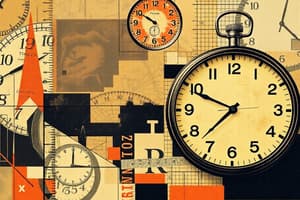Podcast
Questions and Answers
What is the basic unit of time, originally defined as 1/86,400 of a mean solar day?
What is the basic unit of time, originally defined as 1/86,400 of a mean solar day?
- Hour
- Day
- Second (correct)
- Minute
Which unit of time is approximately as long as a natural period related to the motion of the Moon?
Which unit of time is approximately as long as a natural period related to the motion of the Moon?
- Month (correct)
- Week
- Year
- Eon
What is a unit of geologic time, typically defined as 1 billion years or more?
What is a unit of geologic time, typically defined as 1 billion years or more?
- Week
- Day
- Eon (correct)
- Year
How many minutes make up a day?
How many minutes make up a day?
What device has been used historically to measure time using the movement of the Sun?
What device has been used historically to measure time using the movement of the Sun?
What does a sundial measure?
What does a sundial measure?
What is the main method used by a water clock to measure time?
What is the main method used by a water clock to measure time?
Which type of clock uses the vibrations of atoms to measure time?
Which type of clock uses the vibrations of atoms to measure time?
What is the most precise timekeeping device available today?
What is the most precise timekeeping device available today?
What do the units of time and timekeeping devices help us appreciate?
What do the units of time and timekeeping devices help us appreciate?
How many minutes make up an hour?
How many minutes make up an hour?
What is the base unit of time?
What is the base unit of time?
How many days make up a week?
How many days make up a week?
How many seconds make up a minute?
How many seconds make up a minute?
In the Gregorian calendar, approximately how many days long is a month?
In the Gregorian calendar, approximately how many days long is a month?
How many years are in a millennium?
How many years are in a millennium?
What is the equivalent of 5 days in hours?
What is the equivalent of 5 days in hours?
Which unit of time is used to measure periods like the Phanerozoic Eon or the Precambrian Eon?
Which unit of time is used to measure periods like the Phanerozoic Eon or the Precambrian Eon?
If you want to convert 180 minutes to hours, what would be the result?
If you want to convert 180 minutes to hours, what would be the result?
What is the equivalent of 4 centuries in years?
What is the equivalent of 4 centuries in years?
Flashcards are hidden until you start studying
Study Notes
Measuring Time
Time is a fundamental concept that has been measured and tracked by humans for thousands of years. From the early use of sundials and water clocks to the modern atomic clocks, various methods have been developed to measure time. In this article, we will explore the units of time, their origins, and the devices used to measure them.
Units of Time
There are several units of time used in various contexts, ranging from the smallest fractions of a second to the longest periods of time. Some of the most common units of time include:
- Second: The basic unit of time, originally defined as 1/86,400 of a mean solar day.
- Minute: A unit of time equal to 60 seconds.
- Hour: A unit of time equal to 60 minutes or 3,600 seconds.
- Day: A unit of time equal to 24 hours or 1,440 minutes or 86,400 seconds.
- Week: A unit of time equal to seven days or 168 hours.
- Month: A unit of time, used with calendars, which is approximately as long as a natural period related to the motion of the Moon.
- Year: A unit of time, used with calendars, which is approximately the time it takes for the Earth to orbit the Sun.
- Eon: A unit of geologic time, typically defined as 1 billion years or more.
These units of time have been used to measure and track various phenomena, from the movements of celestial bodies to the progress of human endeavors.
Measuring Time Devices
Throughout history, various devices have been developed to measure time. Some of the most notable include:
- Sundial: An instrument that measures time by the position of the sun.
- Water Clock: A timepiece that uses the regulated flow of water to measure time.
- Candle Clock: A timepiece that uses the burning of a candle to measure time.
- Pendulum Clock: A timepiece that uses a swinging pendulum to measure time.
- Quartz Clock: A timepiece that uses the vibrations of a quartz crystal to measure time.
- Atomic Clock: A highly accurate timepiece that uses the vibrations of atoms to measure time.
These devices have evolved over time, becoming more accurate and reliable. Today, atomic clocks are the most precise timekeeping devices available, with some capable of measuring time to within a few seconds over millions of years.
In conclusion, measuring time has been a crucial aspect of human civilization for millennia. By understanding the units of time and the devices used to measure them, we can appreciate the complex and fascinating history of timekeeping.
Studying That Suits You
Use AI to generate personalized quizzes and flashcards to suit your learning preferences.




